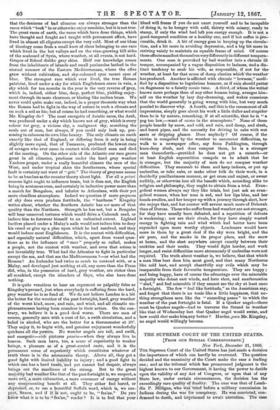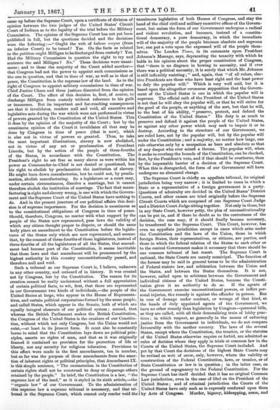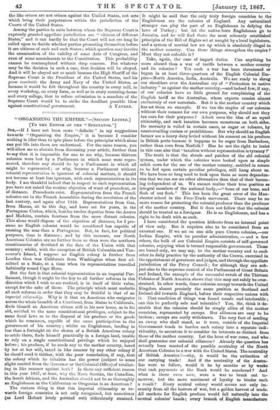New York, December 21, 1866. THE Supreme Court of the
United States has just made a decision the importance of which can hardly be overrated. The question decided and the unanimity of the Court make the case a leading one ; and as the tribunal which has pronounced judgment is the- highest known to our Government, it having the power to decide upon the validity of any Act of Congress, or upon that of any State law, under certain circumstances, the decision has the exceedingly rare quality of finality. The case was that of Lamb- din P. Milligan, who was tried before a military commission in Indiana during the war for conspiracy. He was convicted, con- demned to death, and imprisoned to await execution. The case
came up before the Supreme Court, upon a certificate of division of opinion between the two judges of the United States' Circuit Court of Indiana as to the legality of the trial before the Military Commission. The opinion of the Supreme Court has not yet been published in full, but the questions decided and the decisions were the following :—" Ought the writ, of habeas corpus (from an inferior Court) to be issued? Yes. On the facts as related in the petition ought Milligan to bedischarged from custody? Yes. Had the Military Commission in question the right to try and sentence the said Milligan ? No." These decisions were unani- mous; and to these the majority of the Court added another— that Congress had not the power to appoint such commissions as the one in question, and that in time of war, as well as in that of peace, the Constitution is the supreme law of the land. As to the right of Congress to appoint military commissions in time of war, Chief Justice Chase and three justices dissented from the opinion of the Court. The effect of this decision is, first, of course, to discharge Milligan from custody without reference to his guilt or innocence. But its important and far-reaching consequences are that it invalidates, renders null and void, all executive and legislative acts during the war which were not performed in virtue of powers granted by the Constitution of the United States. This it does by the opinion of the majority of the Court ; but by the unanimous opinion of the Court it invalidates all that may be done by Congress in time of peace (that is now), which is also not in virtue of powers so granted. Thus, to take the most important illustrations, slavery is now abolished, not in virtue of any act or proclamation of President Lincoln, but by the action of the people of three-fourths of the States, in accordance with the Constitution. The President's right to set free as many slaves as were within his power as Commander-in-Chief is not denied or questioned, but his right to abolish by proclamation the institution of slavery. He might burn down manufactories, but he could not, by procla- mation, abolish manufacturing. So a legislature or a court may, under certain circumstances, dissolve a marriage, but it cannot therefore abolish the institution of marriage. The fact that manu- facturing is right and slavery wrong, is one with which the Govern- ment and the Supreme Court of the United States have nothing to do. And in the present juncture of our political affairs this deci- sion is of supreme importance. For the decision is unanimous as to the constitutional obligations of Congress in time of peace. Should, therefore, Congress, no matter with what support by the people of the States now represented, pass laws the validity of which any citizen thought proper to dispute, or should the same body place an amendment to the Constitution before the legisla- tures of the States only which are now represented, and assume that, by the consent of three-fourths of those legislatures, instead of three-fourths of all the legislatures of all the States, that amend- ment had become part of the Constitution, it seems inevitable that those laws and that amendment will be pronounced by the highest authority in this country unconstitutionally passed, and therefore null and void.
Such a tribunal as our Supreme Court is, I believe, unknown in any other country, and unheard of in history. It was created not by Congress, but by the Constitution. The reason for its creation cannot be really understood without a full appreciation of certain political facts, to wit, first, that there are represented in our Government two kinds of individuals,—the people of the United States at large, who appear in the House of Representa- tives, and certain political corporations formed by the same people, and called States, which appear in the Senate, both of which are equally integral elements of our political system ; second, that whereas the British Parliament makes the British Constitution, the Congress of the United States is the creiture of our Constitu- tion, without which not only Congress, but the Union would not exist,—at least in its bresent form. It must also be constantly borne in mind that the Constitution lays down no political prin- ciples, asserts no rights of man, and that as it was originally framed it contained no provision for the protection of life or liberty, nor any security for religious toleration. Provisions to this effect were made in the first amendments, ten in number, but so far was the purpose of these amendments from the asser- tion of inherent rights or political principles, that Amendment IX. is this simple sentence, "The enumeration in the Constitution of certain rights shall not be construed to deny or disparage others retained by the people." In brief, the Constitution is a law, "the supreme law of the land," as it is styled in its sixth article,—the "organic law" of our Government. To the administration of this supreme law a supreme tribunal is necessary, and that tri- bunal is the Supreme Court, which cannot only render void the unanimous legislation of both Houses of Congress, and stay the hand of the chief civil and military executive officer of the Govern- ment, but unless the form of our Government undergoes a radical and violent revolution, and becomes, instead of a constitu- tional democracy, a pure democracy, in which the immediate will of the majority of the people bicomes absolute and supreme law, can put a veto upon the expressed will of the people them- selves. The London Times, in its comments upon President Johnson's Message, says, deprecating the tenacity with which he holds to his opinion about the proper constitution of Congress, that "there is no disgrace in bowing to necessity, and if ever there was a political necessity, it is surely that which Mr. Johnson is still inflexibly resisting ; " and, again, that "of all rulers, elec- tive Presidents are those who have least right and the least power to defy the popular will." Which is very well said, but it is based upon the altogether erroneous supposition that the Govern- ment of the United States is one in which the popular will is supreme. The official oath of the President of the United States is not that he will obey the popular will, or that he will strive for the good of the people, or anything of the sort, but that he will, to the best of his ability, "preserve, protect, and defend the Constitution of the United States." His duty is as much to preserve and defend it against the people of the United States, as against any other power which may seek to impair it or to destroy. According to the structure of our Government, we are ruled here, not by the popular will, but by the popular will under the Constitution ; and a majority, no matter how large, can rule otherwise only by a usurpation as bare and absolute as that of any despot who ever seized a throne. The popular will, when it seeks to overleap the bounds of the Constitution, can be checked, first, by the President's veto, and if that should be overborne, then by the impassable barrier of a decision of the Supreme Court. When this is disregarded, the form of our Government will have undergone an elemental change.
The Supreme Court is chiefly an appellate tribunal, its original jurisdiction being very narrow ; it is limited to cases in which a State or a representative of a foreign government is a party. Questions of admiralty are decided in the United States' District Courts, and other causes are tried originally before the Supreme Circuit Courts which are composed of one Supreme Court Judge and a District Court Judge sitting together. Not only in these, but in any State Court, however petty, the plea of unconstitutionality can be put in, and if there be doubt as to the correctness of the decision, the case may, if it should finally become necessary, be transferred to the Supreme Court. This Court, however, has even no appellate jurisdiction except in cases which arise under the Constitution and the laws of the Union, those in which foreign States, their representatives, or citizens, are parties, and those in which the federal relation of the States to each other or to the central Government makes it necessary that there should be one common tribunal of last resort. The Supreme Court is national, the State Courts are merely municipal. The function of the former may be said in general terms to be the administration of Federal statute law, and arbitration between the Union and the States, and between the States themselves. It is not, however, called upon to arbitrate between the Government and individual citizens of the United States, because the Consti- tution gives it no authority to do so. If the agents of the Government exercise unconstitutional powers, or inflict per- sonal injuries, the remedy is against the offender in person. But in case of damage under contract, or wrongs of that kind, at the hands of duly appointed agents of the Government, we have no other remedy than legislation by Congress—personal bills, as they are called, with all their demoralizing train of lobby prac- tices; in which respect, as generally in the means of enforcing justice from the Government to individuals, we do not compare favourably with the mother country. The laws of the several States, except where the Constitution, the treaties, or the statutes of the United States otherwise require or forbid, are admitted as rules of decision where they apply in trials at common law in the Courts of the United States, the Supreme Court included. And yet by that Court the decisions of the highest State Courts may be revised on writ of error, only, however, where the validity or construction of the Federal Constitution, laws, or treaties, or of State Constitution or law is in question ; in the latter case, on the ground of repugnancy to the Federal Constitution. For the Supreme Court has itself decided that it has no original Common Law jurisdiction, even in the case of libel on the President of the United States ; and of criminal jurisdiction the Courts of the United States have only such as is expressly conferred upon them by Ads of Congress. Murder, bigamy, kidnapping, arson, and the like crimes are not crimes against the United States, not acts which bring their perpetrators within the jurisdiction of the Courts of the United States.
Among the parties in suits between whom the Supreme Court is expressly granted appellate jurisdiction are "citizens of different States," and it can hardly be that the Court will not ere long be called upon to decide whether parties presenting themselves before it are citizens of such and such States ; which question may involve the examination of the validity of some Acts of Congress, and even of some amendments to the Constitution. This probability cannot be contemplated without deep concern. But whatever may be the decision in such a case, that decision will be obeyed. And it will be obeyed not so much because the High Sheriff of the Supreme Court is the President of the United States, and his posse comitatils the Army and Navy of the United States, as because it would be felt throughout the country in every mill, in every workshop, on every farm, as well as in every counting-house and every college, that to refuse submission to a mandate of the Supreme Court would be to strike the deadliest possible blow against constitutional government. A YANKEE.
































 Previous page
Previous page